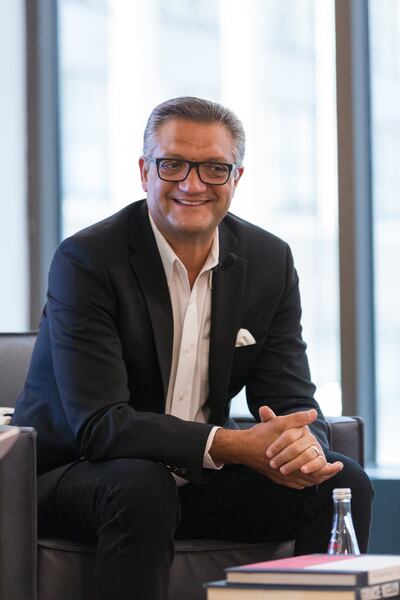
The Business of Fashion
Agenda-setting intelligence, analysis and advice for the global fashion community.

Agenda-setting intelligence, analysis and advice for the global fashion community.

NEW YORK, United States — Over 135 years old and with revenues approaching $9 billion, PVH is a significant player in the global fashion and apparel industries. Headquartered in New York, with operating platforms and offices in every major region, the company acquired Calvin Klein in 2003 and Tommy Hilfiger in 2010.
Nurturing a familial culture across its global organisation — which numbers over 36,000 associates — the company prides itself on its core values: individuality, passion, integrity, partnership and accountability. Striving to ensure senior leadership and management are accessible to all, PVH works hard to engage its associates and invites individuals from all levels in the business to contribute meaningfully, believing that good ideas can come from any part of the business.
Now, PVH is empowering its community of associates to build careers that fulfil them, opening up the entirety of the global organisation to provide future career opportunities and flexible paths reflecting the skill sets they believe will drive the next stage of their career development.
To hear more, BoF sits down with Emanuel Chirico, who joined the company approximately 25 years ago, and is now chairman and chief executive officer.
What is the DNA of the PVH culture?

Emanuel Chirico | Source: Courtesy
The company has always had a real family culture. When I joined the company, a core element that existed was this sense of taking care of the associates, providing the long-term benefits that they need and really being there for them. We may not be the highest compensation payers on day one, but we build our compensation programmes to reward long service. We’re one of the last apparel companies that still has a pension plan in the United States.
As we’ve grown and become a larger company, we’ve focused more on inclusion and diversity. We want our associates to feel comfortable to be who they are when they come to work, to be individuals, and we recognise that everyone is different. We want to get the most out of our associates, so creating an environment in which they feel comfortable is critical to our success.
How do you communicate your culture to over 36,000 employees?
The Calvin Klein acquisition was in the early 2000s, we acquired Tommy Hilfiger in 2010 and we acquired Warnaco in 2013. The latter two were $3 billion acquisitions and, as far as I know, are still records for our industry. So we treated the acquisitions more like mergers — we had this great culture and we wanted to honour these great businesses that had their own cultures.
The challenge I faced was, prior to the acquisition of these businesses, we had one office here in Manhattan and one office in New Jersey that housed 95 percent of our associates, so I would be able to walk the floors and have my finger on the pulse of the business. Back then, we were about 5,000 associates. Today, we’re 36,000 associates and we are much more geographically diverse — we have an approximate billion-dollar business in Asia, approximately 3.8 billion-dollar business in Europe, and an over 4.5 billion-dollar business here in the Americas.
We came to realise we have to build an infrastructure that supports our external communications but, in particular, our internal communications. We needed to tie together our people to the whole company and each of our businesses, so we put a number of programmes in place in order to engage them. That was the challenge. Now, we go out and communicate: this is who we are, this is what we stand for as a company, these are our core values.
Why are your core values such an important part of PVH culture?
Our core values are individuality, passion, integrity, partnership and accountability. I am proud to say that as a company, we all take real ownership of them, at every level of the business. We didn’t just mandate our values, we travelled around the globe and we spoke to our associates. We talked to each of our management teams and we have built consensus around what our core cultural values are. We have written down mission and business practice statements on the way we go to market and the way we do business. It’s really over the last four or five years that our values have become part of who we are, part of our communication, and it has really helped us. It’s a big part of our success.
I really feel that, for a company our size, we are moving forward together because everyone understands where we are trying to take the entire company and where we are trying to take each of the individual brands. There’s an understanding of how we do business, but that takes effort, that takes time and that takes an investment in order to build an infrastructure that supports our communications and engagement across the company. Every time I have a meeting with teams of 20 or 30 people, we always go around the room and ask, “Where do you work and how long have you been with the company?” I am always so impressed with the longevity of our associates’ careers at the company and I believe a huge part of that comes down to our core values.
How do you empower associates to develop their careers within the PVH family?
We try to give people a lot of input into where they want to drive their careers and there are a number of examples where we have cross-pollinated talent across the business environments. We have three distinct brand portfolios and then geographically, there are North American, European, Asian and South American operating platforms. What we have tried to do over time is integrate key players in each of those businesses, at the vice president, director and manager levels, and try to move some of those people — where it makes sense — across the brands and regions. We also have a lot of examples of where people have moved from speciality areas into more general management areas. It’s about trying to make people see the options in front of them.
How do you develop individuals at PVH?
Our people and our brands drive our success. On the people side, from our corporate university, which is PVH University, that didn’t exist with any meaning five years ago. Today, it’s a tremendous learning experience that starts at entry level and also has leadership programmes for our group presidents, partnering with institutions such as Wharton and Harvard to expose them to quality level development and invest in their careers.
But how do you encourage fresh ideas, fresh perspective and balance that as you grow? You also need to bring new talent in. We have a significant programme that goes on when we onboard associates, whether they are right out of college or they have been in business for twenty years. During that orientation programme, we are trying to immerse them in how we do business and how we see our culture. We really involve them in designing their future at the company, thinking about where they want to take their careers and working with their management teams to move forward.
To provide actionable insights and inspiration on how fashion and retail industries can further embed diversity, equity and inclusion in the workplace and business strategies today, BoF Careers co-hosted a panel discussion with The Outsiders Perspective. Now, BoF shares key learnings from the panel.
Discover the most exciting career opportunities now available on BoF Careers — including jobs from Tapestry, Alexander McQueen and Toteme.
A US regulator has banned most uses of the clauses, which started as a way for fashion companies to prevent senior executives from walking off with trade secrets, but have become a standard retention tool.
Check out this week’s new partners and openings on BoF Careers, the global marketplace for fashion talent.